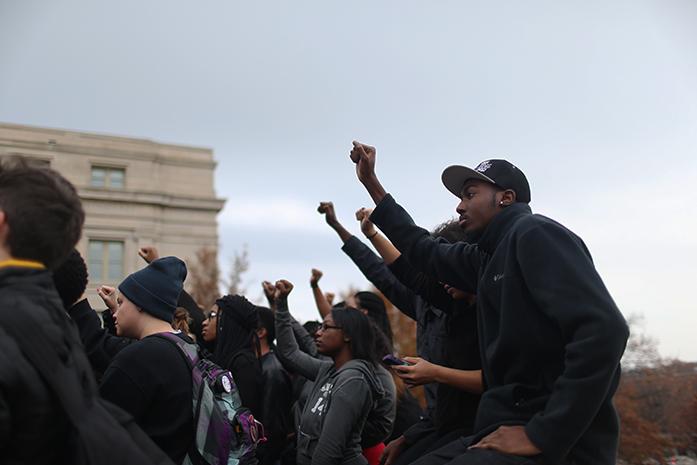No action, no cookie, says UI official on justice
The community came together for a workshop in the Englert on being true accomplices in the fight for liberation of all people.
UI students sit together in front of the Old Capitol building during a demonstration of solidarity in Iowa City on Wednesday. Students gathered in reaction to alleged racially driven incidents on the University of Mizzou’s campus. (The Daily Iowan/Brooklynn Kascel)
November 7, 2016
Under bright stage lights, an intimate audience gathered not to “give each other cookies” but to understand their roles in the fight for social justice.
Tabitha Wiggins, the assistant director for equity & inclusion in the University of Iowa Office of Student Life, led a workshop titled “You Ain’t Getting No Cookies for Doing What is (Racially) Just” on Nov. 5 at the Englert Theater, 221 E. Washington St., as part of the Witching Hour Festival.
Wiggins said she began thinking about social-justice allies and the “ally-industrial complex” as she immersed herself in the Black Lives Matter movement in Iowa City. She said her work at the UI has greatly influenced her belief that equity and inclusion are key to our coexistence in society.
“Our liberation is built into each other,” she said. “I can’t be free until you are free.”
In the workshop, Wiggins sought to educate attendees about the ally movement, which, she said, was established by supposed activists who advance their careers on the struggles they “superficially support.”
Allies strive to become “heroes of the oppressed” while, in actuality, they are exploiting shows of solidarity and support; in other words, Wiggins said, they work to gain “cookies,” or rewards, for their fake activism.
UI student Tanvi Yenna, one of the workshop’s attendees, said she has seen this “fake activism” exhibited among her peers when professors have discriminated against her.
“Peers have gone up to me after class to say, ‘I’m so sorry. That was so horrible that she did that to you,’ but you all didn’t speak up in class and support me in the moment,” she said. “It was like, ‘Thanks, I guess, but you still have to be antiracist in the moment.’ ”
UI sociology lecturer Jennifer Haylett also expressed concerns about discussing social justice in the classroom setting.
“I’m genuinely concerned that when I talk to students about various types of inequalities that what I am creating at the end of the day are just more and more allies,” she said. “Especially if you only have [students] for a small period of time, they move on, and you talk about it, and then everyone feels like, ‘Yeah, we’re done. We’re good.’ ”
What Haylett hoped to create instead were accomplices, which Wiggins said are the people who see liberation as something that is contingent on the liberation of others as she previously described.
After attending Wiggins’ workshop, Haylett said, she felt better equipped to discuss social justice and inequalities with students in the classroom.
“That talk in particular helped me think about making sure that when I talk about these things, I’m not just addressing stuff at the individual level, how people are feeling about it, but also thinking about structural issues,” she said.
As the workshop came to a close, Wiggins left attendees with the reminder that achieving equality for all people, regardless of race, will be a struggle, but people can contribute to the fight for social justice without risking their lives.
“There’s a difference between being unsafe and being uncomfortable,” she said.
Wiggins cautioned people against being too quick to pat themselves on the back for their work.
“Don’t wait around for anyone to proclaim you to be an accomplice,” she said. “Don’t wait around for me to put that cookie on your shirt. I’m not going to do that, and you’ll be waiting forever.”



